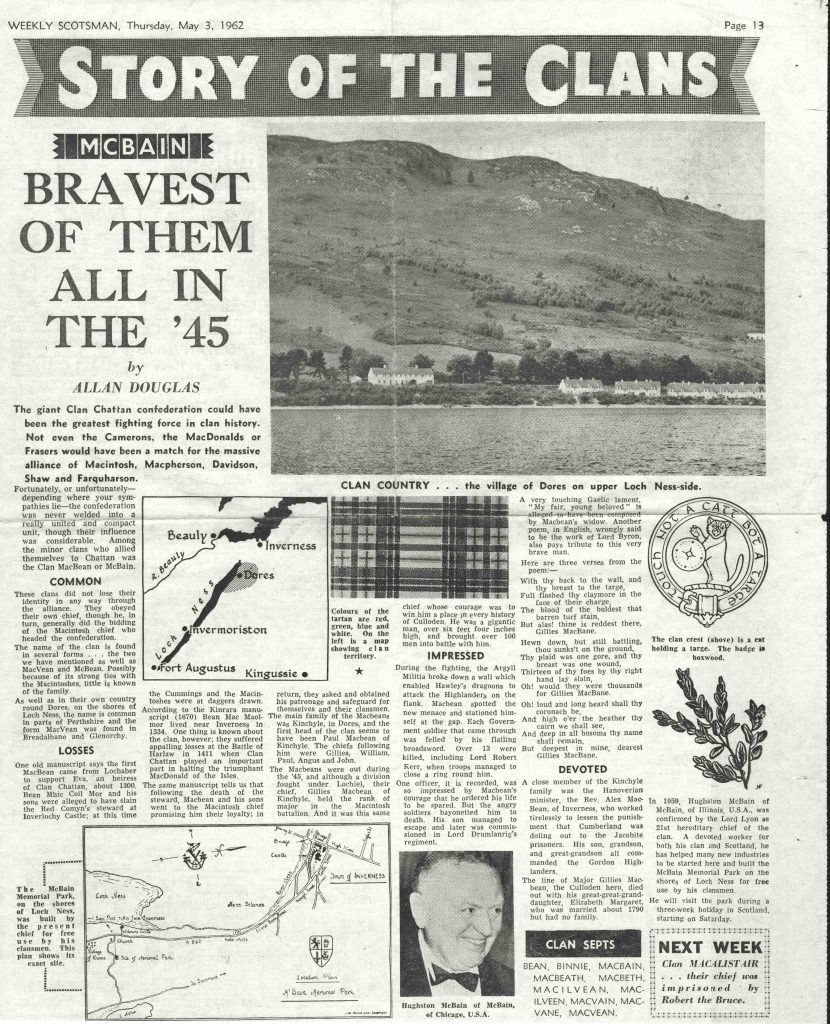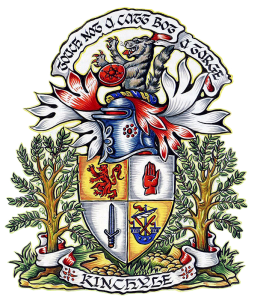WEEKLY SCOTSMAN, Thursday, May 3, 1962

Story of The Clans
BRAVEST OF THEM ALL IN THE ’45
By Allan Douglas
The giant Clan Chattan confederation could have been the greatest fighting force in clan history. Not even the Camerons, the MacDonalds or Frasers would have been a match for the massive alliance of Macintosh, Macpherson, Davidson, Shaw and Farquharson.
Fortunately, or unfortunately—depending where your sympathies lie—the confederation was never welded into a really united and compact unit, though their influence was considerable. Among the minor clans who allied themselves to Chattan was the Clan MacBean or McBain.
COMMON
These clans did not lose their identity in any way through the alliance. They obeyed their own chief, though he, in turn, generally did the bidding of the Macintosh chief who headed the confederation.
The name of the clan is found in several forms . . . the two we have mentioned as well as MacVean and McBean. Possibly because of its strong ties with the Macintoshes, little is known of the family.
As well as in their own country round Dores, on the shores of Loch Ness, the name is common in parts of Perthshire and the form MacVean was found in Breadalbane and Glenorchy.
LOSSES
One old manuscript says the first MacBean cam from Lochaber to support Eva, an heiress of Clan Chattan, about 1300. Bean Mhic Coil Mor and his sons were alleged to have slain the Red Comyn’s steward at Inverlochy Castle; at this time the Cummings and the Macintoshes were at daggers drawn.
According to the Kinrara manuscript (1670) Bean Mac Maolmor lived near Inverness in 1334. One thing is known about the clan, however; they suffered appalling losses at the Battle of Harlaw in 1441 when Clan Chattan played an important part in halting the triumphant MacDonald of the Isles.
The same manuscript tells us that following the death of the steward, Macbean and his sons went to the Macintosh chief promising him their loyalty; in return, they asked and obtained his patronage and safeguard for themselves and their clansmen.
The main family of the Macbeans was Kinchyle, in Dores, and the first head of the clan seems to have been Paul Macbean of Kinchyle. The chiefs following him were Gillies, William, Paul, Angus, and John.
The Macbeans were out during the ’45, and altough a division fought under Lochiel, their chief, Gillies Macbean of Kinchyle, held the rank of major in the Macintosh battalion. And it was this same chief whose courage was to win him a place in every history of Culloden. He was a gigantic man, over six feet four inches high, and brought over 100 men into battle with him.
IMPRESSED
During the fighting, the Argyll Militia broke down a wall which enabled Hawley’s dragoons to attack the Highlanders on the flank. Macbean spotted the new menace and stationed himself at the gap. Each Government soldier that came through was felled by his flailing broadsword. Over 13 were killed, including Lord Robert Kerr, when troops managed to close a ring round him.
One officer, it is recorded, was so impressed by Macbean’s courage that he ordered his life to be spared. But the angry soldiers bayonetted him to death. His son managed to escape and later was commissioned in Lord Drumlanrig’s regiment.
A very touching Gaelic lament, “My fair, young beloved” is alleged to have been composed by Macbean’s widow. Another poem, in English, wrongly said to be the work of Lord Byron, also pays tribute to this very brave man.
Here are three verses from the poem: –
With thy back to the wall, and thy breast to the targe,
Full flashed thy claymore in the face of their charge,
The blood of the boldest that barren turf stain
But alas! thine is reddest there, Gillies MacBane.
Hewn down, but still battling, thou sunks’t on the ground,
Thy plaid was one gore, and thy breast was one wound,
Thirteen of thy foes by thy right hand lay slain,
Oh! would they were thousands for Gillies MacBane.
Oh! loud and long heard shall thy caronach be,
And high o’er the heather thy cairn we shall see,
And deep in all bosoms thy name shall remain.
But deepest in mine, dearest Gillies MacBane.
DEVOTED
A close member of the Kinchyle family was the Hanoverian minister, the Rev. Alex MacBean, of Inverness, who worked tirelessly to lessen the punishment that Cumberland was doling out to the Jacobite prisoners. His son, grandson, and great-grandson all commanded the Gordon Highlanders.
The line of Major Gillies Macbean, the Culloden hero, died out with his great-great-granddaughter, Elizabeth Margaret, who was married about 1790 but had no family.
The clan crest (above) is a cat holding a targe. The badge is boxwood.
In 1959, Hughston McBain of McBain, of Illinois, U.S.A., was confirmed by the Lord Lyon as 21st hereditary chief of the clan. A devoted worker for both his clan and Scotland, he has helped many new industries to be started here and built the McBain Memorial Park on the shores of Loch Ness for free use by his clansmen.
He will visit the park during a three-week holiday in Scotland, starting on Saturday.
Right click (in the middle of the image) chose open image in new window or tab. Left click and image will magnify for easy reading.
